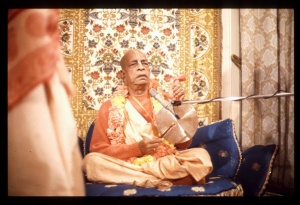SB 1.17.41: Difference between revisions
m (1 revision(s)) |
No edit summary |
||
| Line 1: | Line 1: | ||
{{info | {{info | ||
|speaker= | |speaker=Sūta Gosvāmī | ||
|listener=Sages of | |listener=Sages of Naimiṣāraṇya | ||
}} | }} | ||
[[Category:Srimad-Bhagavatam - Canto 01 Chapter 17]] | |||
[[Category:Bhagavatam Verses Spoken by Suta Gosvami - Vanisource|011741]] | |||
<div style="float:left">'''[[Srimad-Bhagavatam]] - [[SB 1|First Canto]] - [[SB 1.17: Punishment and Reward of Kali|Chapter 17: Punishment and Reward of Kali]]'''</div> | |||
<div style="float:right">[[File:Go-previous.png|link=SB 1.17.40]] '''[[SB 1.17.40]] - [[SB 1.17.42]]''' [[File:Go-next.png|link=SB 1.17.42]]</div> | |||
{{CompareVersions|SB|1.17.41|SB 1965|SB 1972-77}} | |||
{{RandomImage}} | |||
==== TEXT 41 ==== | ==== TEXT 41 ==== | ||
<div class="verse"> | |||
<div | :athaitāni na seveta | ||
athaitāni na seveta | :bubhūṣuḥ puruṣaḥ kvacit | ||
bubhūṣuḥ puruṣaḥ kvacit | :viśeṣato dharma-śīlo | ||
viśeṣato dharma-śīlo | :rājā loka-patir guruḥ | ||
rājā loka-patir guruḥ | |||
</div> | </div> | ||
| Line 18: | Line 23: | ||
==== SYNONYMS ==== | ==== SYNONYMS ==== | ||
<div class="synonyms"> | |||
<div | ''atha''—therefore; ''etāni''—all these; ''na''—never; ''seveta''—come in contact; ''bubhūṣuḥ''—those who desire well-being; ''puruṣaḥ''—person; ''kvacit''—in any circumstances; ''viśeṣataḥ''—specifically; ''dharma-śīlaḥ''—those who are on the progressive path of liberation; ''rājā''—the king; ''loka-patiḥ''—public leader; ''guruḥ''—the ''brāhmaṇas'' and the ''sannyāsīs''. | ||
</div> | </div> | ||
| Line 26: | Line 30: | ||
==== TRANSLATION ==== | ==== TRANSLATION ==== | ||
<div class="translation"> | |||
<div | |||
Therefore, whoever desires progressive well-being, especially kings, religionists, public leaders, brāhmaṇas and sannyāsīs, should never come in contact with the four above-mentioned irreligious principles. | Therefore, whoever desires progressive well-being, especially kings, religionists, public leaders, brāhmaṇas and sannyāsīs, should never come in contact with the four above-mentioned irreligious principles. | ||
</div> | </div> | ||
| Line 34: | Line 37: | ||
==== PURPORT ==== | ==== PURPORT ==== | ||
<div class="purport"> | |||
The ''brāhmaṇas'' are the religious preceptors for all other castes, and the ''sannyāsīs'' are the spiritual masters for all the castes and orders of society. So also are the king and the public leaders who are responsible for the material welfare of all people. The progressive religionists and those who are responsible human beings or those who do not want to spoil their valuable human lives should refrain from all the principles of irreligiosity, especially illicit connection with women. If a ''brāhmaṇa'' is not truthful, all his claims as a ''brāhmaṇa'' at once become null and void. If a ''sannyāsī'' is illicitly connected with women, all his claims as a ''sannyāsī'' at once become false. Similarly, if the king and the public leader are unnecessarily proud or habituated to drinking and smoking, certainly they become disqualified to discharge public welfare activities. Truthfulness is the basic principle for all religions. The four leaders of the human society, namely the ''sannyāsīs'', the ''brāhmaṇa'', the king and the public leader, must be tested crucially by their character and qualification. Before one can be accepted as a spiritual or material master of society, he must be tested by the above-mentioned criteria of character. Such public leaders may be less qualified in academic qualifications, but it is necessary primarily that they be free from the contamination of the four disqualifications, namely gambling, drinking, prostitution and animal slaughter. | |||
</div> | |||
<div | |||
<div style="float:right; clear:both;">[[File:Go-previous.png|link=SB 1.17.40]] '''[[SB 1.17.40]] - [[SB 1.17.42]]''' [[File:Go-next.png|link=SB 1.17.42]]</div> | |||
</div> | __NOTOC__ | ||
__NOTOC__ | __NOEDITSECTION__ | ||
Revision as of 12:57, 2 May 2021

A.C. Bhaktivedanta Swami Prabhupada
TEXT 41
- athaitāni na seveta
- bubhūṣuḥ puruṣaḥ kvacit
- viśeṣato dharma-śīlo
- rājā loka-patir guruḥ
SYNONYMS
atha—therefore; etāni—all these; na—never; seveta—come in contact; bubhūṣuḥ—those who desire well-being; puruṣaḥ—person; kvacit—in any circumstances; viśeṣataḥ—specifically; dharma-śīlaḥ—those who are on the progressive path of liberation; rājā—the king; loka-patiḥ—public leader; guruḥ—the brāhmaṇas and the sannyāsīs.
TRANSLATION
Therefore, whoever desires progressive well-being, especially kings, religionists, public leaders, brāhmaṇas and sannyāsīs, should never come in contact with the four above-mentioned irreligious principles.
PURPORT
The brāhmaṇas are the religious preceptors for all other castes, and the sannyāsīs are the spiritual masters for all the castes and orders of society. So also are the king and the public leaders who are responsible for the material welfare of all people. The progressive religionists and those who are responsible human beings or those who do not want to spoil their valuable human lives should refrain from all the principles of irreligiosity, especially illicit connection with women. If a brāhmaṇa is not truthful, all his claims as a brāhmaṇa at once become null and void. If a sannyāsī is illicitly connected with women, all his claims as a sannyāsī at once become false. Similarly, if the king and the public leader are unnecessarily proud or habituated to drinking and smoking, certainly they become disqualified to discharge public welfare activities. Truthfulness is the basic principle for all religions. The four leaders of the human society, namely the sannyāsīs, the brāhmaṇa, the king and the public leader, must be tested crucially by their character and qualification. Before one can be accepted as a spiritual or material master of society, he must be tested by the above-mentioned criteria of character. Such public leaders may be less qualified in academic qualifications, but it is necessary primarily that they be free from the contamination of the four disqualifications, namely gambling, drinking, prostitution and animal slaughter.